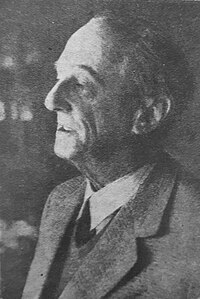Hugo Steinhaus | |
|---|---|
 Hugo Steinhaus (1968) | |
| Born | Hugo Dyonizy Steinhaus 14 January 1887 Jasło, Austria-Hungary (now Poland) |
| Died | 25 February 1972 (aged 85) |
| Nationality | Polish |
| Alma mater | Lemberg University Göttingen University |
| Known for | Banach–Steinhaus theorem, many others, see section below. |
| Awards | Stefan Banach Prize (1946) |
| Scientific career | |
| Fields | Mathematician and mathematics populariser |
| Institutions | Jan Kazimierz University University of Wrocław University of Notre Dame University of Sussex |
| Doctoral advisor | David Hilbert |
| Doctoral students | Stefan Banach Z. W. (Bill) Birnbaum Mark Kac Władysław Orlicz Aleksander Rajchman Juliusz Schauder Stanisław Trybula |
Hugo Dyonizy Steinhaus (English: /ˈhjuːɡoʊ ˈstaɪnhaʊs/ HEW-goh STYNE-howss, Polish: [ˈxuɡɔ ˈʂtajnxaws], German: [ˈhuːɡoː ˈʃtaɪnhaʊs]; 14 January 1887 – 25 February 1972) was a Polish mathematician and educator. Steinhaus obtained his PhD under David Hilbert at Göttingen University in 1911 and later became a professor at the Jan Kazimierz University in Lwów (now Lviv, Ukraine), where he helped establish what later became known as the Lwów School of Mathematics. He is credited with "discovering" mathematician Stefan Banach, with whom he gave a notable contribution to functional analysis through the Banach–Steinhaus theorem. After World War II Steinhaus played an important part in the establishment of the mathematics department at Wrocław University and in the revival of Polish mathematics from the destruction of the war.
Author of around 170 scientific articles and books, Steinhaus has left his legacy and contribution in many branches of mathematics, such as functional analysis, geometry, mathematical logic, and trigonometry. Notably he is regarded as one of the early founders of game theory and probability theory, which led to later development of more comprehensive approaches by other scholars.